HI6025 Accounting Theory: IFRS Adoption - A Critical Review
VerifiedAdded on 2022/12/28
|18
|4567
|29
Report
AI Summary
This report presents a critical review of the adoption of International Financial Reporting Standards (IFRS), focusing on the experiences of Australia and Germany. It begins with an introduction to the conceptual framework of financial reporting and its significance. The report then delves into a comparative analysis of IFRS adoption in the two countries, highlighting the logics behind adoption, transitional issues encountered, challenges faced by reporting entities, and the advantages gained. The analysis covers the impact on financial statements, investor confidence, and public sector improvements. Furthermore, the report evaluates the performance of IFRS in both countries and suggests enhancements for the future success of IFRS implementation. The findings are based on relevant literature and provide insights into the complexities and outcomes of IFRS adoption in different national contexts.
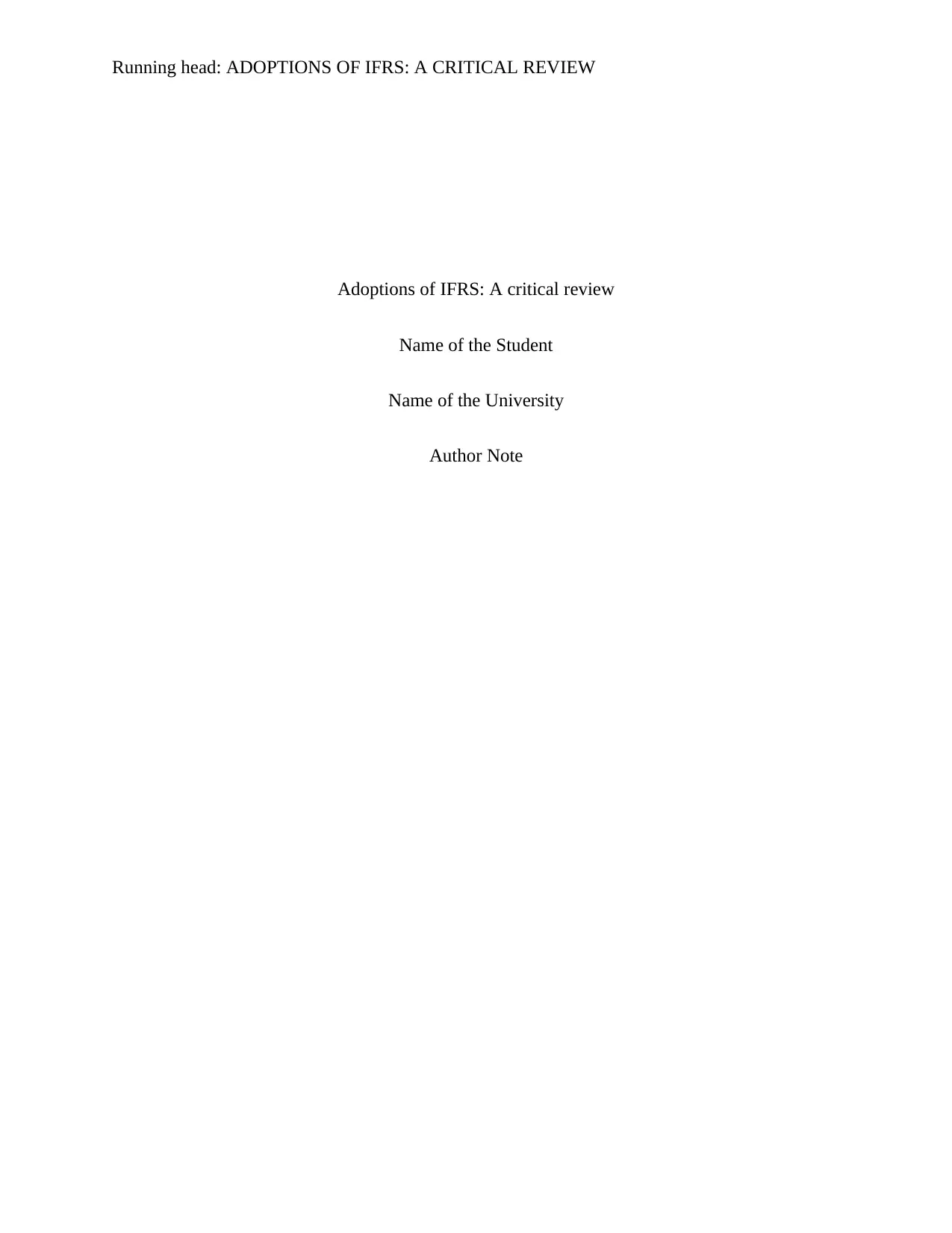
Running head: ADOPTIONS OF IFRS: A CRITICAL REVIEW
Adoptions of IFRS: A critical review
Name of the Student
Name of the University
Author Note
Adoptions of IFRS: A critical review
Name of the Student
Name of the University
Author Note
Paraphrase This Document
Need a fresh take? Get an instant paraphrase of this document with our AI Paraphraser
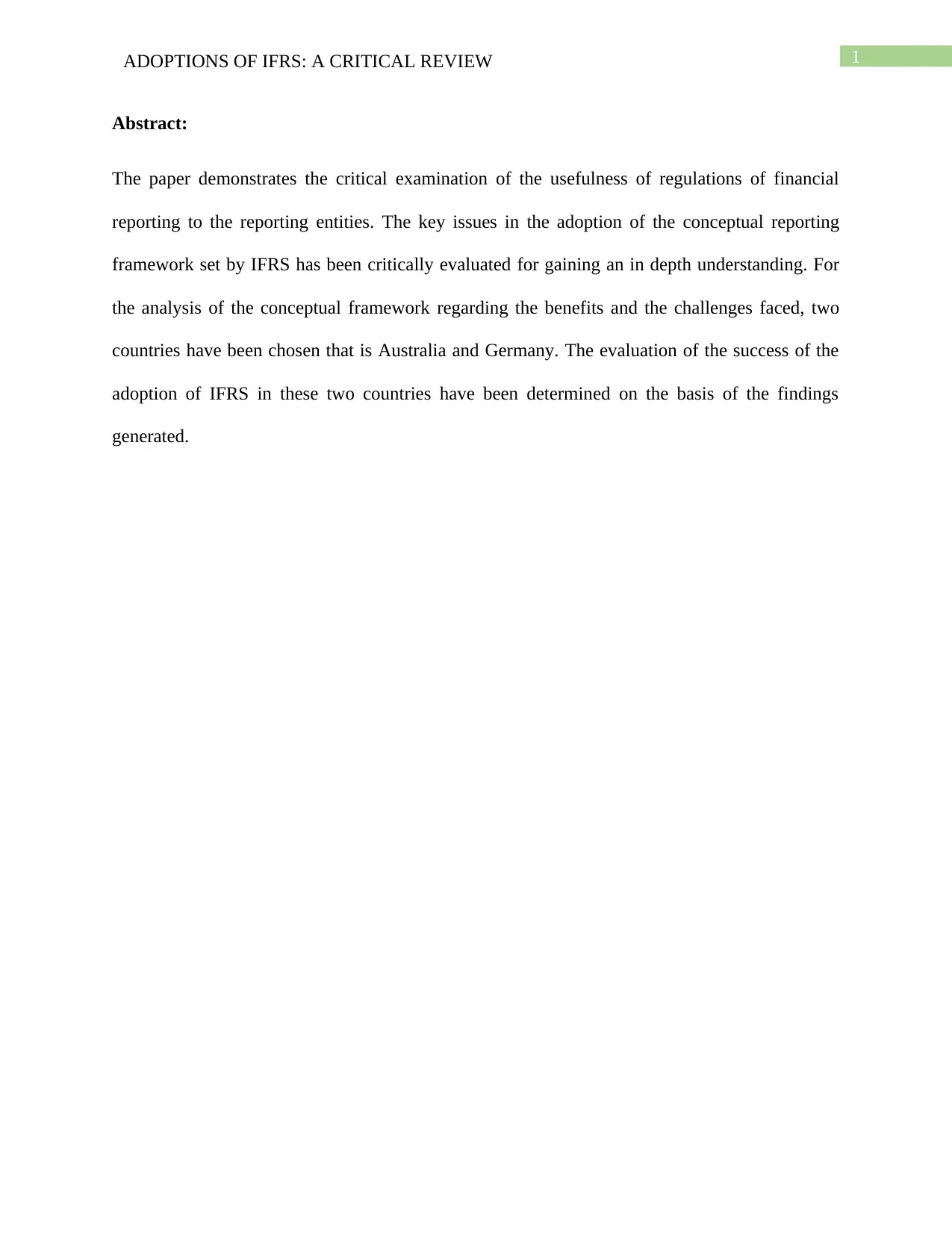
1ADOPTIONS OF IFRS: A CRITICAL REVIEW
Abstract:
The paper demonstrates the critical examination of the usefulness of regulations of financial
reporting to the reporting entities. The key issues in the adoption of the conceptual reporting
framework set by IFRS has been critically evaluated for gaining an in depth understanding. For
the analysis of the conceptual framework regarding the benefits and the challenges faced, two
countries have been chosen that is Australia and Germany. The evaluation of the success of the
adoption of IFRS in these two countries have been determined on the basis of the findings
generated.
Abstract:
The paper demonstrates the critical examination of the usefulness of regulations of financial
reporting to the reporting entities. The key issues in the adoption of the conceptual reporting
framework set by IFRS has been critically evaluated for gaining an in depth understanding. For
the analysis of the conceptual framework regarding the benefits and the challenges faced, two
countries have been chosen that is Australia and Germany. The evaluation of the success of the
adoption of IFRS in these two countries have been determined on the basis of the findings
generated.
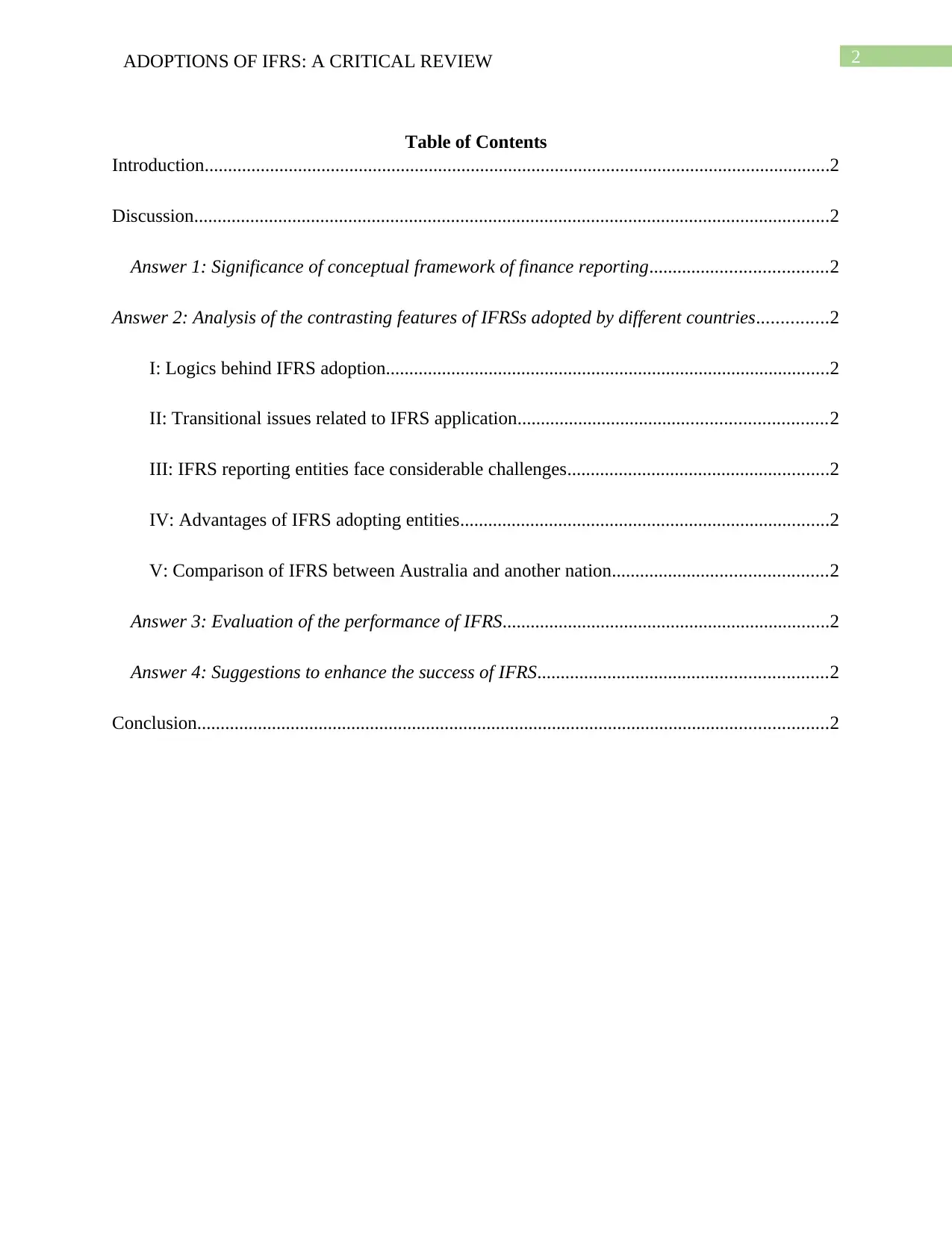
2ADOPTIONS OF IFRS: A CRITICAL REVIEW
Table of Contents
Introduction......................................................................................................................................2
Discussion........................................................................................................................................2
Answer 1: Significance of conceptual framework of finance reporting......................................2
Answer 2: Analysis of the contrasting features of IFRSs adopted by different countries...............2
I: Logics behind IFRS adoption...............................................................................................2
II: Transitional issues related to IFRS application..................................................................2
III: IFRS reporting entities face considerable challenges........................................................2
IV: Advantages of IFRS adopting entities...............................................................................2
V: Comparison of IFRS between Australia and another nation..............................................2
Answer 3: Evaluation of the performance of IFRS......................................................................2
Answer 4: Suggestions to enhance the success of IFRS..............................................................2
Conclusion.......................................................................................................................................2
Table of Contents
Introduction......................................................................................................................................2
Discussion........................................................................................................................................2
Answer 1: Significance of conceptual framework of finance reporting......................................2
Answer 2: Analysis of the contrasting features of IFRSs adopted by different countries...............2
I: Logics behind IFRS adoption...............................................................................................2
II: Transitional issues related to IFRS application..................................................................2
III: IFRS reporting entities face considerable challenges........................................................2
IV: Advantages of IFRS adopting entities...............................................................................2
V: Comparison of IFRS between Australia and another nation..............................................2
Answer 3: Evaluation of the performance of IFRS......................................................................2
Answer 4: Suggestions to enhance the success of IFRS..............................................................2
Conclusion.......................................................................................................................................2
⊘ This is a preview!⊘
Do you want full access?
Subscribe today to unlock all pages.

Trusted by 1+ million students worldwide
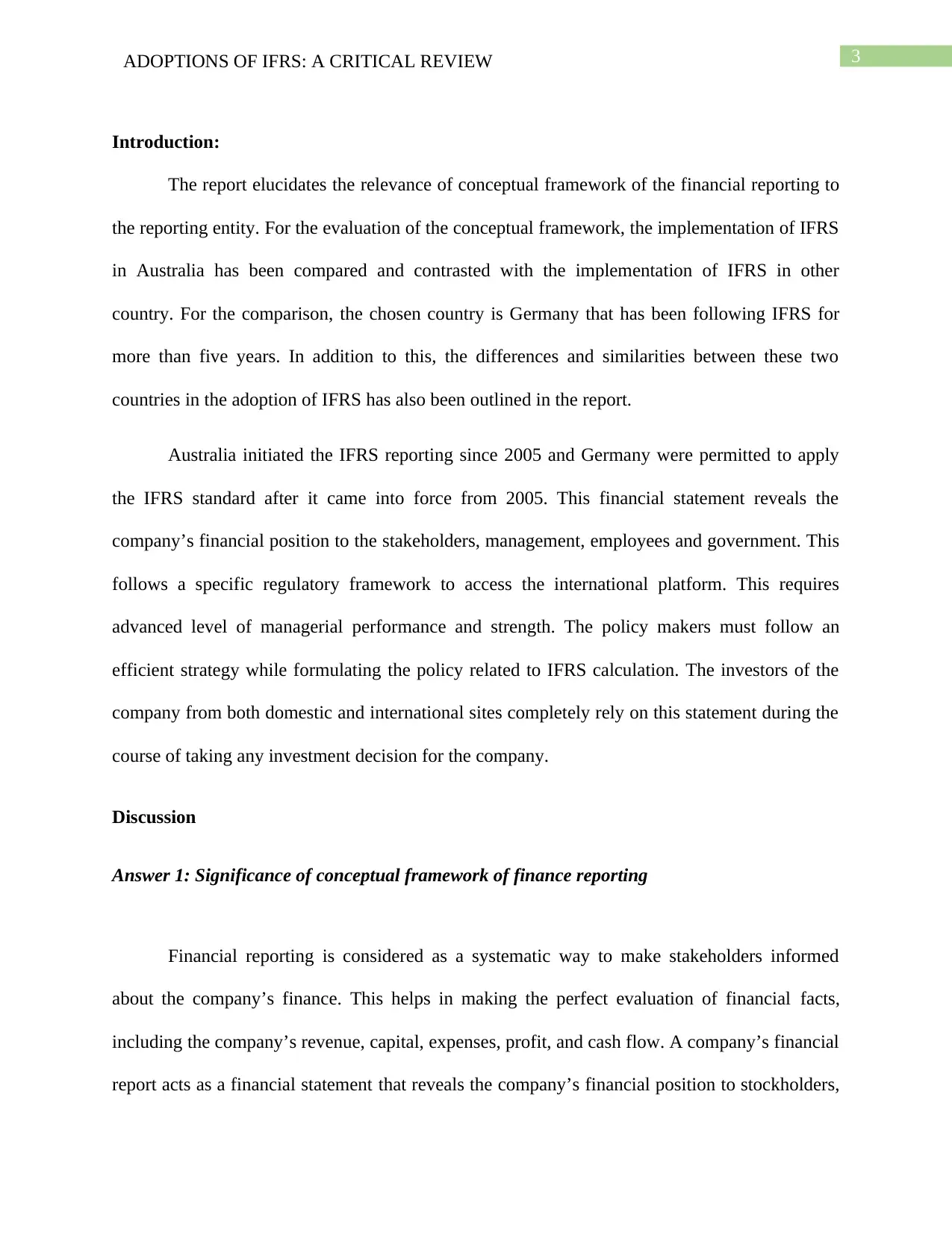
3ADOPTIONS OF IFRS: A CRITICAL REVIEW
Introduction:
The report elucidates the relevance of conceptual framework of the financial reporting to
the reporting entity. For the evaluation of the conceptual framework, the implementation of IFRS
in Australia has been compared and contrasted with the implementation of IFRS in other
country. For the comparison, the chosen country is Germany that has been following IFRS for
more than five years. In addition to this, the differences and similarities between these two
countries in the adoption of IFRS has also been outlined in the report.
Australia initiated the IFRS reporting since 2005 and Germany were permitted to apply
the IFRS standard after it came into force from 2005. This financial statement reveals the
company’s financial position to the stakeholders, management, employees and government. This
follows a specific regulatory framework to access the international platform. This requires
advanced level of managerial performance and strength. The policy makers must follow an
efficient strategy while formulating the policy related to IFRS calculation. The investors of the
company from both domestic and international sites completely rely on this statement during the
course of taking any investment decision for the company.
Discussion
Answer 1: Significance of conceptual framework of finance reporting
Financial reporting is considered as a systematic way to make stakeholders informed
about the company’s finance. This helps in making the perfect evaluation of financial facts,
including the company’s revenue, capital, expenses, profit, and cash flow. A company’s financial
report acts as a financial statement that reveals the company’s financial position to stockholders,
Introduction:
The report elucidates the relevance of conceptual framework of the financial reporting to
the reporting entity. For the evaluation of the conceptual framework, the implementation of IFRS
in Australia has been compared and contrasted with the implementation of IFRS in other
country. For the comparison, the chosen country is Germany that has been following IFRS for
more than five years. In addition to this, the differences and similarities between these two
countries in the adoption of IFRS has also been outlined in the report.
Australia initiated the IFRS reporting since 2005 and Germany were permitted to apply
the IFRS standard after it came into force from 2005. This financial statement reveals the
company’s financial position to the stakeholders, management, employees and government. This
follows a specific regulatory framework to access the international platform. This requires
advanced level of managerial performance and strength. The policy makers must follow an
efficient strategy while formulating the policy related to IFRS calculation. The investors of the
company from both domestic and international sites completely rely on this statement during the
course of taking any investment decision for the company.
Discussion
Answer 1: Significance of conceptual framework of finance reporting
Financial reporting is considered as a systematic way to make stakeholders informed
about the company’s finance. This helps in making the perfect evaluation of financial facts,
including the company’s revenue, capital, expenses, profit, and cash flow. A company’s financial
report acts as a financial statement that reveals the company’s financial position to stockholders,
Paraphrase This Document
Need a fresh take? Get an instant paraphrase of this document with our AI Paraphraser
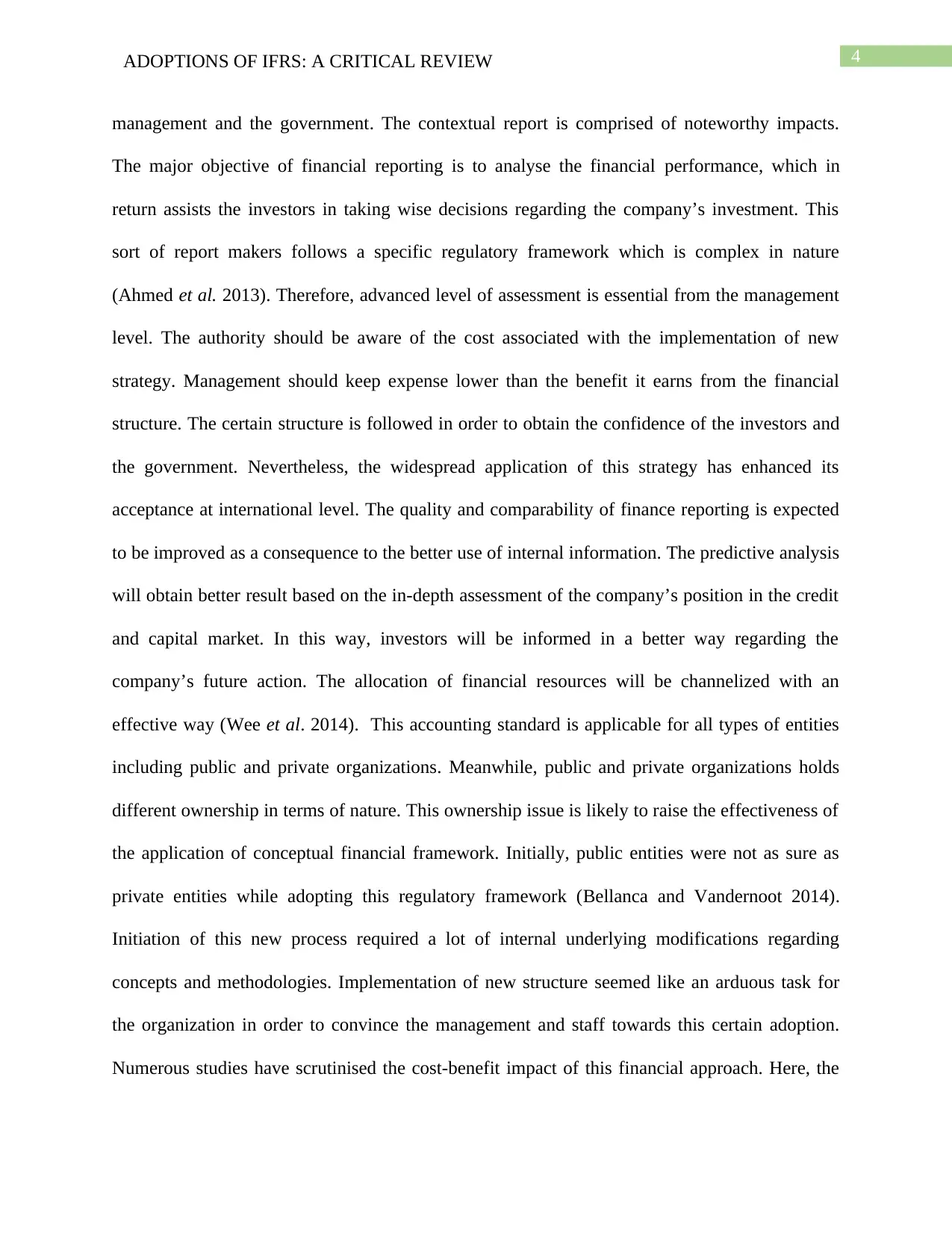
4ADOPTIONS OF IFRS: A CRITICAL REVIEW
management and the government. The contextual report is comprised of noteworthy impacts.
The major objective of financial reporting is to analyse the financial performance, which in
return assists the investors in taking wise decisions regarding the company’s investment. This
sort of report makers follows a specific regulatory framework which is complex in nature
(Ahmed et al. 2013). Therefore, advanced level of assessment is essential from the management
level. The authority should be aware of the cost associated with the implementation of new
strategy. Management should keep expense lower than the benefit it earns from the financial
structure. The certain structure is followed in order to obtain the confidence of the investors and
the government. Nevertheless, the widespread application of this strategy has enhanced its
acceptance at international level. The quality and comparability of finance reporting is expected
to be improved as a consequence to the better use of internal information. The predictive analysis
will obtain better result based on the in-depth assessment of the company’s position in the credit
and capital market. In this way, investors will be informed in a better way regarding the
company’s future action. The allocation of financial resources will be channelized with an
effective way (Wee et al. 2014). This accounting standard is applicable for all types of entities
including public and private organizations. Meanwhile, public and private organizations holds
different ownership in terms of nature. This ownership issue is likely to raise the effectiveness of
the application of conceptual financial framework. Initially, public entities were not as sure as
private entities while adopting this regulatory framework (Bellanca and Vandernoot 2014).
Initiation of this new process required a lot of internal underlying modifications regarding
concepts and methodologies. Implementation of new structure seemed like an arduous task for
the organization in order to convince the management and staff towards this certain adoption.
Numerous studies have scrutinised the cost-benefit impact of this financial approach. Here, the
management and the government. The contextual report is comprised of noteworthy impacts.
The major objective of financial reporting is to analyse the financial performance, which in
return assists the investors in taking wise decisions regarding the company’s investment. This
sort of report makers follows a specific regulatory framework which is complex in nature
(Ahmed et al. 2013). Therefore, advanced level of assessment is essential from the management
level. The authority should be aware of the cost associated with the implementation of new
strategy. Management should keep expense lower than the benefit it earns from the financial
structure. The certain structure is followed in order to obtain the confidence of the investors and
the government. Nevertheless, the widespread application of this strategy has enhanced its
acceptance at international level. The quality and comparability of finance reporting is expected
to be improved as a consequence to the better use of internal information. The predictive analysis
will obtain better result based on the in-depth assessment of the company’s position in the credit
and capital market. In this way, investors will be informed in a better way regarding the
company’s future action. The allocation of financial resources will be channelized with an
effective way (Wee et al. 2014). This accounting standard is applicable for all types of entities
including public and private organizations. Meanwhile, public and private organizations holds
different ownership in terms of nature. This ownership issue is likely to raise the effectiveness of
the application of conceptual financial framework. Initially, public entities were not as sure as
private entities while adopting this regulatory framework (Bellanca and Vandernoot 2014).
Initiation of this new process required a lot of internal underlying modifications regarding
concepts and methodologies. Implementation of new structure seemed like an arduous task for
the organization in order to convince the management and staff towards this certain adoption.
Numerous studies have scrutinised the cost-benefit impact of this financial approach. Here, the
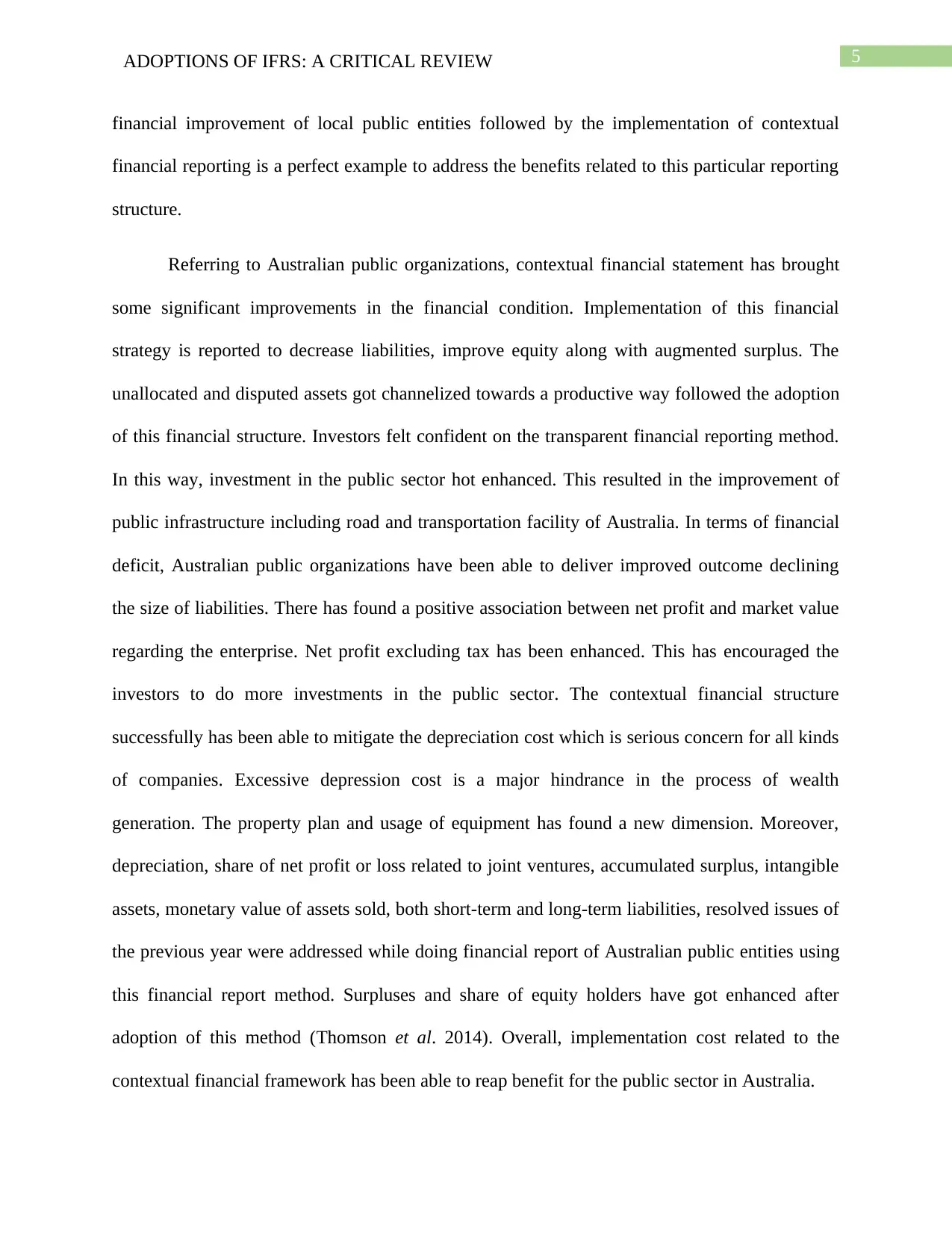
5ADOPTIONS OF IFRS: A CRITICAL REVIEW
financial improvement of local public entities followed by the implementation of contextual
financial reporting is a perfect example to address the benefits related to this particular reporting
structure.
Referring to Australian public organizations, contextual financial statement has brought
some significant improvements in the financial condition. Implementation of this financial
strategy is reported to decrease liabilities, improve equity along with augmented surplus. The
unallocated and disputed assets got channelized towards a productive way followed the adoption
of this financial structure. Investors felt confident on the transparent financial reporting method.
In this way, investment in the public sector hot enhanced. This resulted in the improvement of
public infrastructure including road and transportation facility of Australia. In terms of financial
deficit, Australian public organizations have been able to deliver improved outcome declining
the size of liabilities. There has found a positive association between net profit and market value
regarding the enterprise. Net profit excluding tax has been enhanced. This has encouraged the
investors to do more investments in the public sector. The contextual financial structure
successfully has been able to mitigate the depreciation cost which is serious concern for all kinds
of companies. Excessive depression cost is a major hindrance in the process of wealth
generation. The property plan and usage of equipment has found a new dimension. Moreover,
depreciation, share of net profit or loss related to joint ventures, accumulated surplus, intangible
assets, monetary value of assets sold, both short-term and long-term liabilities, resolved issues of
the previous year were addressed while doing financial report of Australian public entities using
this financial report method. Surpluses and share of equity holders have got enhanced after
adoption of this method (Thomson et al. 2014). Overall, implementation cost related to the
contextual financial framework has been able to reap benefit for the public sector in Australia.
financial improvement of local public entities followed by the implementation of contextual
financial reporting is a perfect example to address the benefits related to this particular reporting
structure.
Referring to Australian public organizations, contextual financial statement has brought
some significant improvements in the financial condition. Implementation of this financial
strategy is reported to decrease liabilities, improve equity along with augmented surplus. The
unallocated and disputed assets got channelized towards a productive way followed the adoption
of this financial structure. Investors felt confident on the transparent financial reporting method.
In this way, investment in the public sector hot enhanced. This resulted in the improvement of
public infrastructure including road and transportation facility of Australia. In terms of financial
deficit, Australian public organizations have been able to deliver improved outcome declining
the size of liabilities. There has found a positive association between net profit and market value
regarding the enterprise. Net profit excluding tax has been enhanced. This has encouraged the
investors to do more investments in the public sector. The contextual financial structure
successfully has been able to mitigate the depreciation cost which is serious concern for all kinds
of companies. Excessive depression cost is a major hindrance in the process of wealth
generation. The property plan and usage of equipment has found a new dimension. Moreover,
depreciation, share of net profit or loss related to joint ventures, accumulated surplus, intangible
assets, monetary value of assets sold, both short-term and long-term liabilities, resolved issues of
the previous year were addressed while doing financial report of Australian public entities using
this financial report method. Surpluses and share of equity holders have got enhanced after
adoption of this method (Thomson et al. 2014). Overall, implementation cost related to the
contextual financial framework has been able to reap benefit for the public sector in Australia.
⊘ This is a preview!⊘
Do you want full access?
Subscribe today to unlock all pages.

Trusted by 1+ million students worldwide
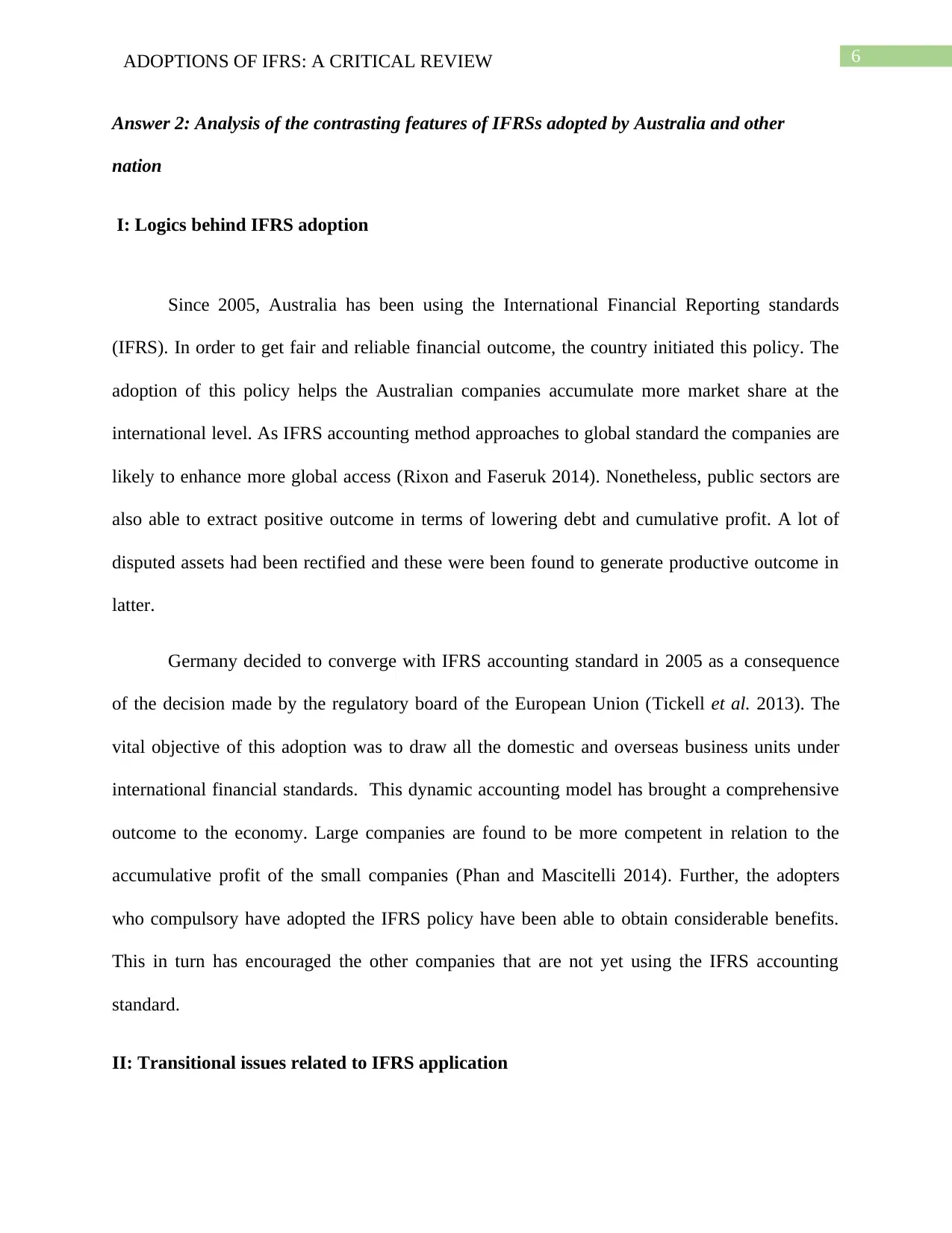
6ADOPTIONS OF IFRS: A CRITICAL REVIEW
Answer 2: Analysis of the contrasting features of IFRSs adopted by Australia and other
nation
I: Logics behind IFRS adoption
Since 2005, Australia has been using the International Financial Reporting standards
(IFRS). In order to get fair and reliable financial outcome, the country initiated this policy. The
adoption of this policy helps the Australian companies accumulate more market share at the
international level. As IFRS accounting method approaches to global standard the companies are
likely to enhance more global access (Rixon and Faseruk 2014). Nonetheless, public sectors are
also able to extract positive outcome in terms of lowering debt and cumulative profit. A lot of
disputed assets had been rectified and these were been found to generate productive outcome in
latter.
Germany decided to converge with IFRS accounting standard in 2005 as a consequence
of the decision made by the regulatory board of the European Union (Tickell et al. 2013). The
vital objective of this adoption was to draw all the domestic and overseas business units under
international financial standards. This dynamic accounting model has brought a comprehensive
outcome to the economy. Large companies are found to be more competent in relation to the
accumulative profit of the small companies (Phan and Mascitelli 2014). Further, the adopters
who compulsory have adopted the IFRS policy have been able to obtain considerable benefits.
This in turn has encouraged the other companies that are not yet using the IFRS accounting
standard.
II: Transitional issues related to IFRS application
Answer 2: Analysis of the contrasting features of IFRSs adopted by Australia and other
nation
I: Logics behind IFRS adoption
Since 2005, Australia has been using the International Financial Reporting standards
(IFRS). In order to get fair and reliable financial outcome, the country initiated this policy. The
adoption of this policy helps the Australian companies accumulate more market share at the
international level. As IFRS accounting method approaches to global standard the companies are
likely to enhance more global access (Rixon and Faseruk 2014). Nonetheless, public sectors are
also able to extract positive outcome in terms of lowering debt and cumulative profit. A lot of
disputed assets had been rectified and these were been found to generate productive outcome in
latter.
Germany decided to converge with IFRS accounting standard in 2005 as a consequence
of the decision made by the regulatory board of the European Union (Tickell et al. 2013). The
vital objective of this adoption was to draw all the domestic and overseas business units under
international financial standards. This dynamic accounting model has brought a comprehensive
outcome to the economy. Large companies are found to be more competent in relation to the
accumulative profit of the small companies (Phan and Mascitelli 2014). Further, the adopters
who compulsory have adopted the IFRS policy have been able to obtain considerable benefits.
This in turn has encouraged the other companies that are not yet using the IFRS accounting
standard.
II: Transitional issues related to IFRS application
Paraphrase This Document
Need a fresh take? Get an instant paraphrase of this document with our AI Paraphraser
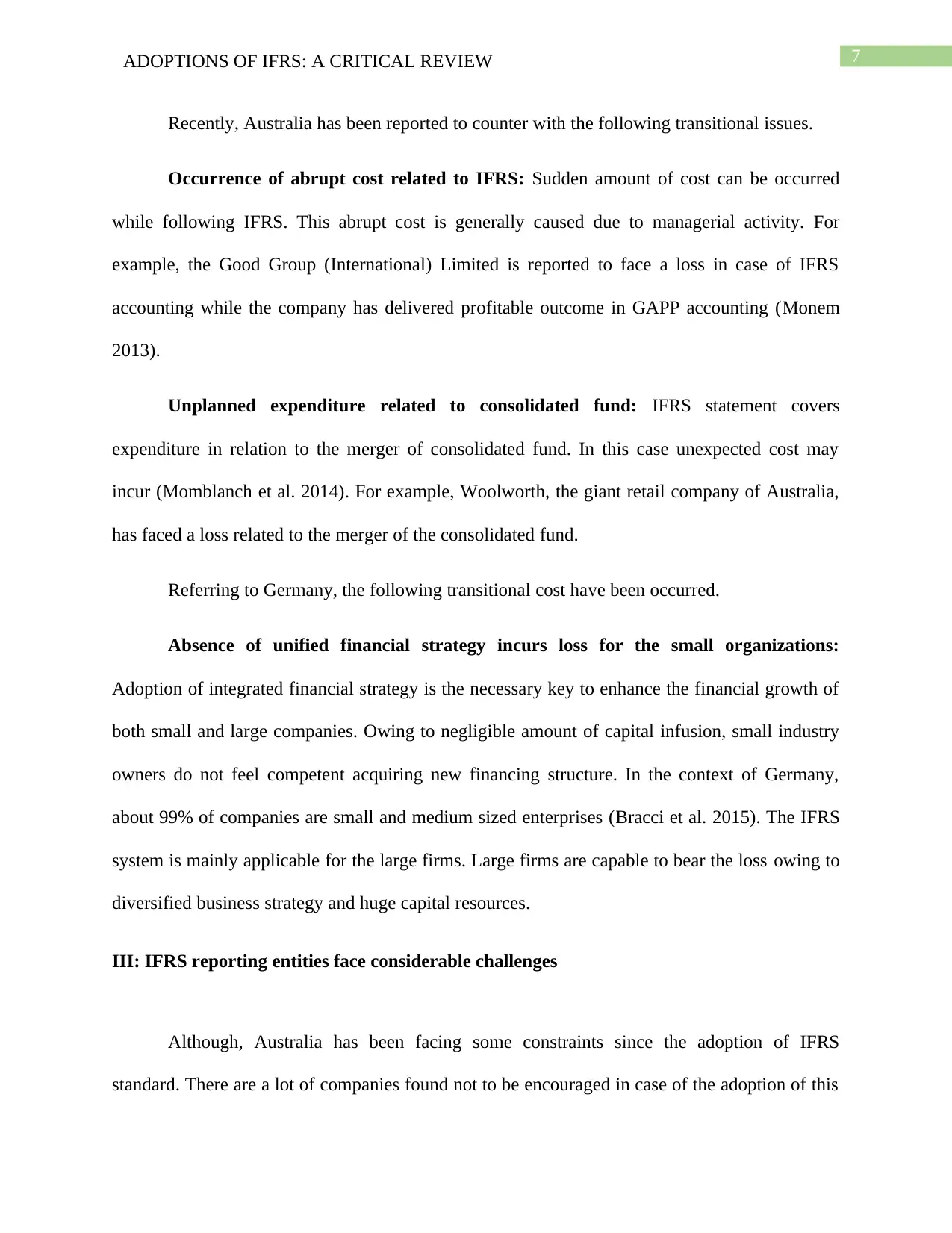
7ADOPTIONS OF IFRS: A CRITICAL REVIEW
Recently, Australia has been reported to counter with the following transitional issues.
Occurrence of abrupt cost related to IFRS: Sudden amount of cost can be occurred
while following IFRS. This abrupt cost is generally caused due to managerial activity. For
example, the Good Group (International) Limited is reported to face a loss in case of IFRS
accounting while the company has delivered profitable outcome in GAPP accounting (Monem
2013).
Unplanned expenditure related to consolidated fund: IFRS statement covers
expenditure in relation to the merger of consolidated fund. In this case unexpected cost may
incur (Momblanch et al. 2014). For example, Woolworth, the giant retail company of Australia,
has faced a loss related to the merger of the consolidated fund.
Referring to Germany, the following transitional cost have been occurred.
Absence of unified financial strategy incurs loss for the small organizations:
Adoption of integrated financial strategy is the necessary key to enhance the financial growth of
both small and large companies. Owing to negligible amount of capital infusion, small industry
owners do not feel competent acquiring new financing structure. In the context of Germany,
about 99% of companies are small and medium sized enterprises (Bracci et al. 2015). The IFRS
system is mainly applicable for the large firms. Large firms are capable to bear the loss owing to
diversified business strategy and huge capital resources.
III: IFRS reporting entities face considerable challenges
Although, Australia has been facing some constraints since the adoption of IFRS
standard. There are a lot of companies found not to be encouraged in case of the adoption of this
Recently, Australia has been reported to counter with the following transitional issues.
Occurrence of abrupt cost related to IFRS: Sudden amount of cost can be occurred
while following IFRS. This abrupt cost is generally caused due to managerial activity. For
example, the Good Group (International) Limited is reported to face a loss in case of IFRS
accounting while the company has delivered profitable outcome in GAPP accounting (Monem
2013).
Unplanned expenditure related to consolidated fund: IFRS statement covers
expenditure in relation to the merger of consolidated fund. In this case unexpected cost may
incur (Momblanch et al. 2014). For example, Woolworth, the giant retail company of Australia,
has faced a loss related to the merger of the consolidated fund.
Referring to Germany, the following transitional cost have been occurred.
Absence of unified financial strategy incurs loss for the small organizations:
Adoption of integrated financial strategy is the necessary key to enhance the financial growth of
both small and large companies. Owing to negligible amount of capital infusion, small industry
owners do not feel competent acquiring new financing structure. In the context of Germany,
about 99% of companies are small and medium sized enterprises (Bracci et al. 2015). The IFRS
system is mainly applicable for the large firms. Large firms are capable to bear the loss owing to
diversified business strategy and huge capital resources.
III: IFRS reporting entities face considerable challenges
Although, Australia has been facing some constraints since the adoption of IFRS
standard. There are a lot of companies found not to be encouraged in case of the adoption of this
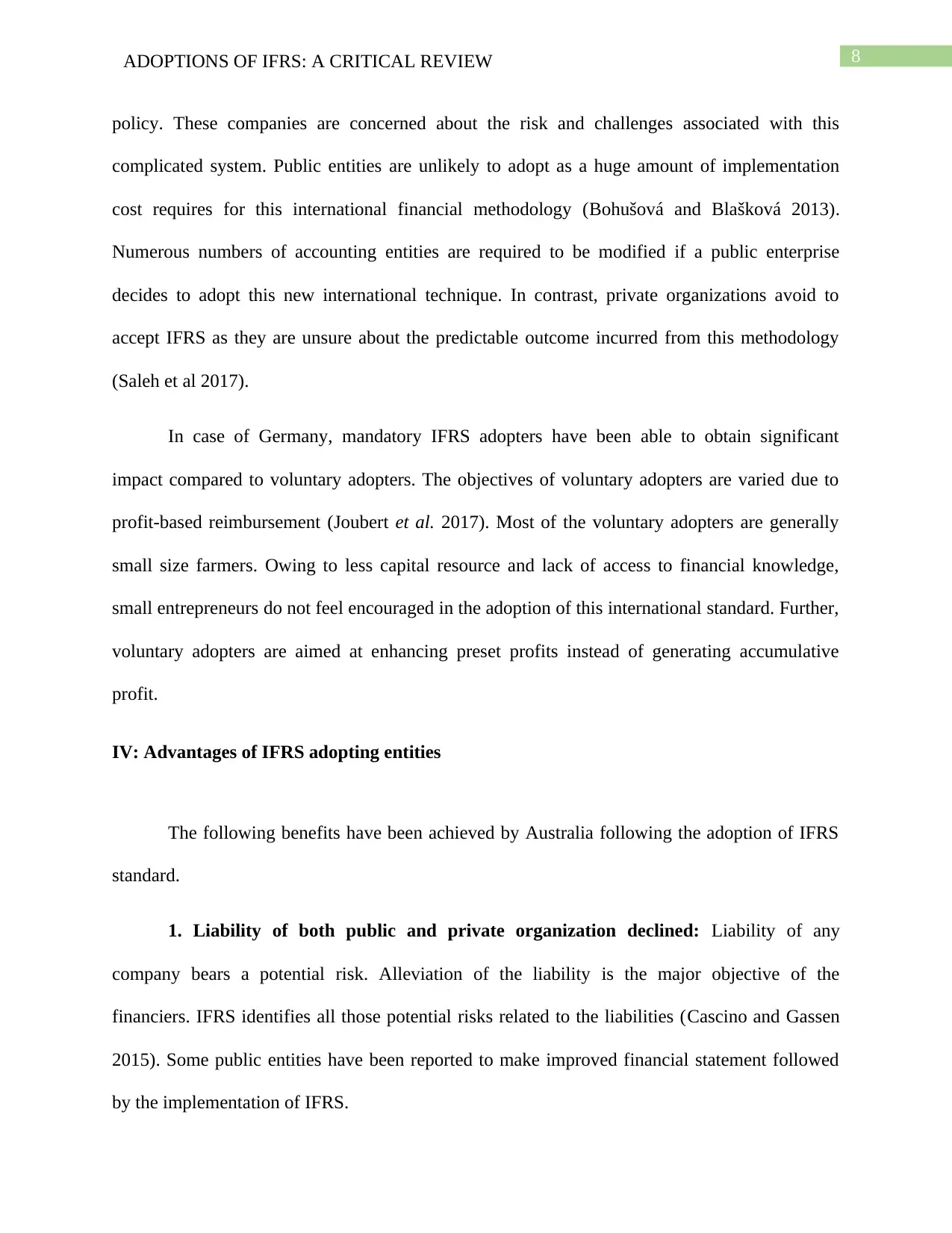
8ADOPTIONS OF IFRS: A CRITICAL REVIEW
policy. These companies are concerned about the risk and challenges associated with this
complicated system. Public entities are unlikely to adopt as a huge amount of implementation
cost requires for this international financial methodology (Bohušová and Blašková 2013).
Numerous numbers of accounting entities are required to be modified if a public enterprise
decides to adopt this new international technique. In contrast, private organizations avoid to
accept IFRS as they are unsure about the predictable outcome incurred from this methodology
(Saleh et al 2017).
In case of Germany, mandatory IFRS adopters have been able to obtain significant
impact compared to voluntary adopters. The objectives of voluntary adopters are varied due to
profit-based reimbursement (Joubert et al. 2017). Most of the voluntary adopters are generally
small size farmers. Owing to less capital resource and lack of access to financial knowledge,
small entrepreneurs do not feel encouraged in the adoption of this international standard. Further,
voluntary adopters are aimed at enhancing preset profits instead of generating accumulative
profit.
IV: Advantages of IFRS adopting entities
The following benefits have been achieved by Australia following the adoption of IFRS
standard.
1. Liability of both public and private organization declined: Liability of any
company bears a potential risk. Alleviation of the liability is the major objective of the
financiers. IFRS identifies all those potential risks related to the liabilities (Cascino and Gassen
2015). Some public entities have been reported to make improved financial statement followed
by the implementation of IFRS.
policy. These companies are concerned about the risk and challenges associated with this
complicated system. Public entities are unlikely to adopt as a huge amount of implementation
cost requires for this international financial methodology (Bohušová and Blašková 2013).
Numerous numbers of accounting entities are required to be modified if a public enterprise
decides to adopt this new international technique. In contrast, private organizations avoid to
accept IFRS as they are unsure about the predictable outcome incurred from this methodology
(Saleh et al 2017).
In case of Germany, mandatory IFRS adopters have been able to obtain significant
impact compared to voluntary adopters. The objectives of voluntary adopters are varied due to
profit-based reimbursement (Joubert et al. 2017). Most of the voluntary adopters are generally
small size farmers. Owing to less capital resource and lack of access to financial knowledge,
small entrepreneurs do not feel encouraged in the adoption of this international standard. Further,
voluntary adopters are aimed at enhancing preset profits instead of generating accumulative
profit.
IV: Advantages of IFRS adopting entities
The following benefits have been achieved by Australia following the adoption of IFRS
standard.
1. Liability of both public and private organization declined: Liability of any
company bears a potential risk. Alleviation of the liability is the major objective of the
financiers. IFRS identifies all those potential risks related to the liabilities (Cascino and Gassen
2015). Some public entities have been reported to make improved financial statement followed
by the implementation of IFRS.
⊘ This is a preview!⊘
Do you want full access?
Subscribe today to unlock all pages.

Trusted by 1+ million students worldwide
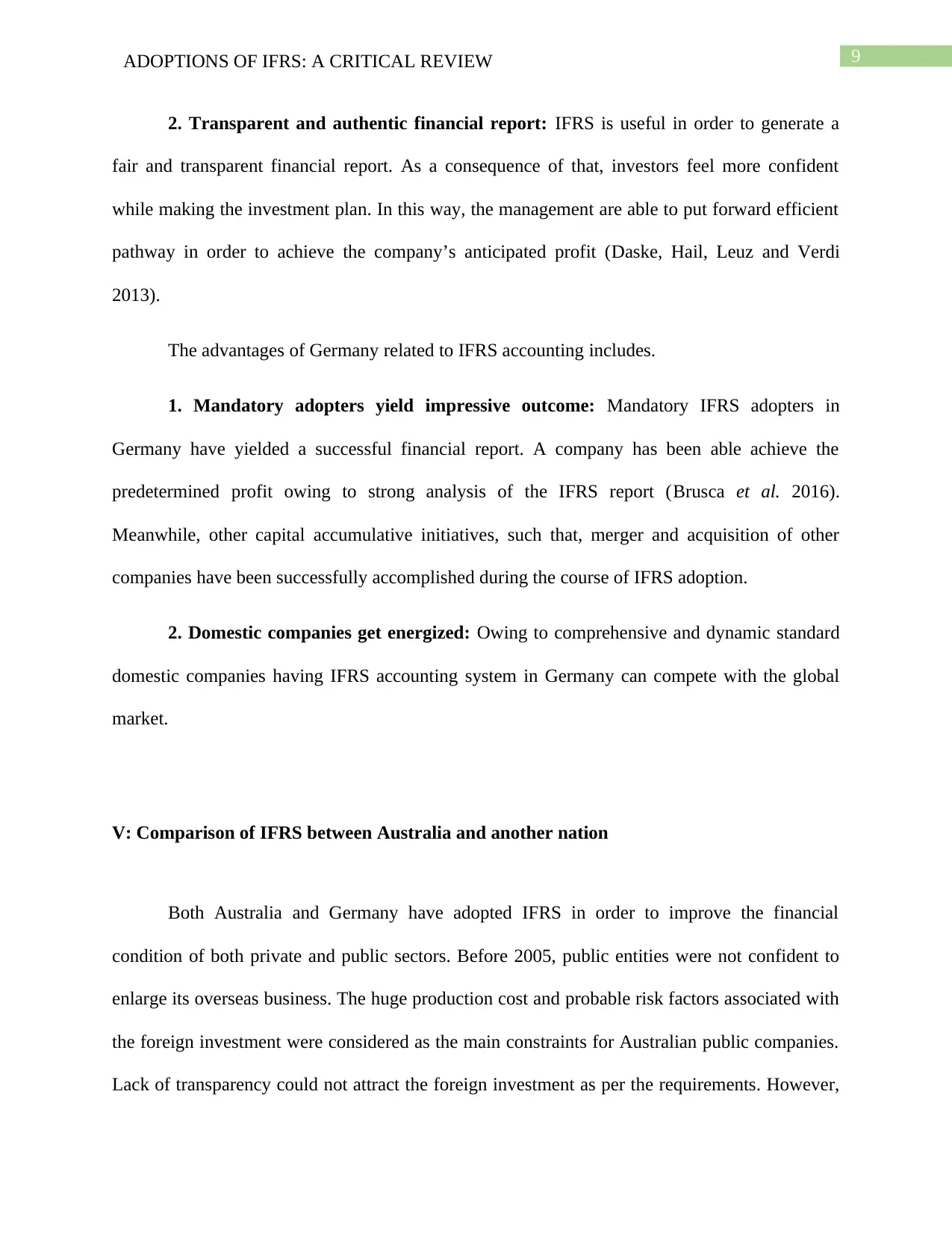
9ADOPTIONS OF IFRS: A CRITICAL REVIEW
2. Transparent and authentic financial report: IFRS is useful in order to generate a
fair and transparent financial report. As a consequence of that, investors feel more confident
while making the investment plan. In this way, the management are able to put forward efficient
pathway in order to achieve the company’s anticipated profit (Daske, Hail, Leuz and Verdi
2013).
The advantages of Germany related to IFRS accounting includes.
1. Mandatory adopters yield impressive outcome: Mandatory IFRS adopters in
Germany have yielded a successful financial report. A company has been able achieve the
predetermined profit owing to strong analysis of the IFRS report (Brusca et al. 2016).
Meanwhile, other capital accumulative initiatives, such that, merger and acquisition of other
companies have been successfully accomplished during the course of IFRS adoption.
2. Domestic companies get energized: Owing to comprehensive and dynamic standard
domestic companies having IFRS accounting system in Germany can compete with the global
market.
V: Comparison of IFRS between Australia and another nation
Both Australia and Germany have adopted IFRS in order to improve the financial
condition of both private and public sectors. Before 2005, public entities were not confident to
enlarge its overseas business. The huge production cost and probable risk factors associated with
the foreign investment were considered as the main constraints for Australian public companies.
Lack of transparency could not attract the foreign investment as per the requirements. However,
2. Transparent and authentic financial report: IFRS is useful in order to generate a
fair and transparent financial report. As a consequence of that, investors feel more confident
while making the investment plan. In this way, the management are able to put forward efficient
pathway in order to achieve the company’s anticipated profit (Daske, Hail, Leuz and Verdi
2013).
The advantages of Germany related to IFRS accounting includes.
1. Mandatory adopters yield impressive outcome: Mandatory IFRS adopters in
Germany have yielded a successful financial report. A company has been able achieve the
predetermined profit owing to strong analysis of the IFRS report (Brusca et al. 2016).
Meanwhile, other capital accumulative initiatives, such that, merger and acquisition of other
companies have been successfully accomplished during the course of IFRS adoption.
2. Domestic companies get energized: Owing to comprehensive and dynamic standard
domestic companies having IFRS accounting system in Germany can compete with the global
market.
V: Comparison of IFRS between Australia and another nation
Both Australia and Germany have adopted IFRS in order to improve the financial
condition of both private and public sectors. Before 2005, public entities were not confident to
enlarge its overseas business. The huge production cost and probable risk factors associated with
the foreign investment were considered as the main constraints for Australian public companies.
Lack of transparency could not attract the foreign investment as per the requirements. However,
Paraphrase This Document
Need a fresh take? Get an instant paraphrase of this document with our AI Paraphraser
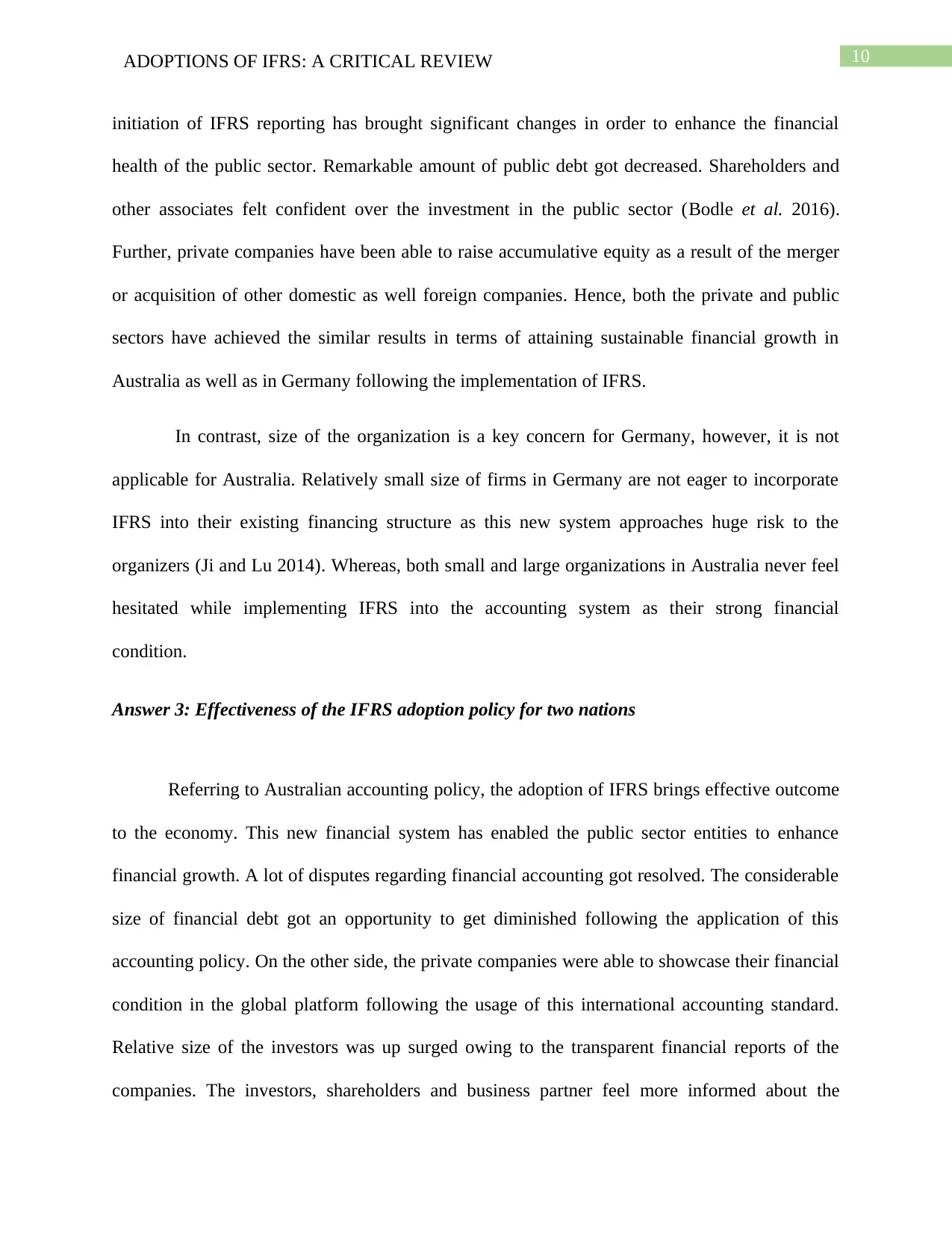
10ADOPTIONS OF IFRS: A CRITICAL REVIEW
initiation of IFRS reporting has brought significant changes in order to enhance the financial
health of the public sector. Remarkable amount of public debt got decreased. Shareholders and
other associates felt confident over the investment in the public sector (Bodle et al. 2016).
Further, private companies have been able to raise accumulative equity as a result of the merger
or acquisition of other domestic as well foreign companies. Hence, both the private and public
sectors have achieved the similar results in terms of attaining sustainable financial growth in
Australia as well as in Germany following the implementation of IFRS.
In contrast, size of the organization is a key concern for Germany, however, it is not
applicable for Australia. Relatively small size of firms in Germany are not eager to incorporate
IFRS into their existing financing structure as this new system approaches huge risk to the
organizers (Ji and Lu 2014). Whereas, both small and large organizations in Australia never feel
hesitated while implementing IFRS into the accounting system as their strong financial
condition.
Answer 3: Effectiveness of the IFRS adoption policy for two nations
Referring to Australian accounting policy, the adoption of IFRS brings effective outcome
to the economy. This new financial system has enabled the public sector entities to enhance
financial growth. A lot of disputes regarding financial accounting got resolved. The considerable
size of financial debt got an opportunity to get diminished following the application of this
accounting policy. On the other side, the private companies were able to showcase their financial
condition in the global platform following the usage of this international accounting standard.
Relative size of the investors was up surged owing to the transparent financial reports of the
companies. The investors, shareholders and business partner feel more informed about the
initiation of IFRS reporting has brought significant changes in order to enhance the financial
health of the public sector. Remarkable amount of public debt got decreased. Shareholders and
other associates felt confident over the investment in the public sector (Bodle et al. 2016).
Further, private companies have been able to raise accumulative equity as a result of the merger
or acquisition of other domestic as well foreign companies. Hence, both the private and public
sectors have achieved the similar results in terms of attaining sustainable financial growth in
Australia as well as in Germany following the implementation of IFRS.
In contrast, size of the organization is a key concern for Germany, however, it is not
applicable for Australia. Relatively small size of firms in Germany are not eager to incorporate
IFRS into their existing financing structure as this new system approaches huge risk to the
organizers (Ji and Lu 2014). Whereas, both small and large organizations in Australia never feel
hesitated while implementing IFRS into the accounting system as their strong financial
condition.
Answer 3: Effectiveness of the IFRS adoption policy for two nations
Referring to Australian accounting policy, the adoption of IFRS brings effective outcome
to the economy. This new financial system has enabled the public sector entities to enhance
financial growth. A lot of disputes regarding financial accounting got resolved. The considerable
size of financial debt got an opportunity to get diminished following the application of this
accounting policy. On the other side, the private companies were able to showcase their financial
condition in the global platform following the usage of this international accounting standard.
Relative size of the investors was up surged owing to the transparent financial reports of the
companies. The investors, shareholders and business partner feel more informed about the
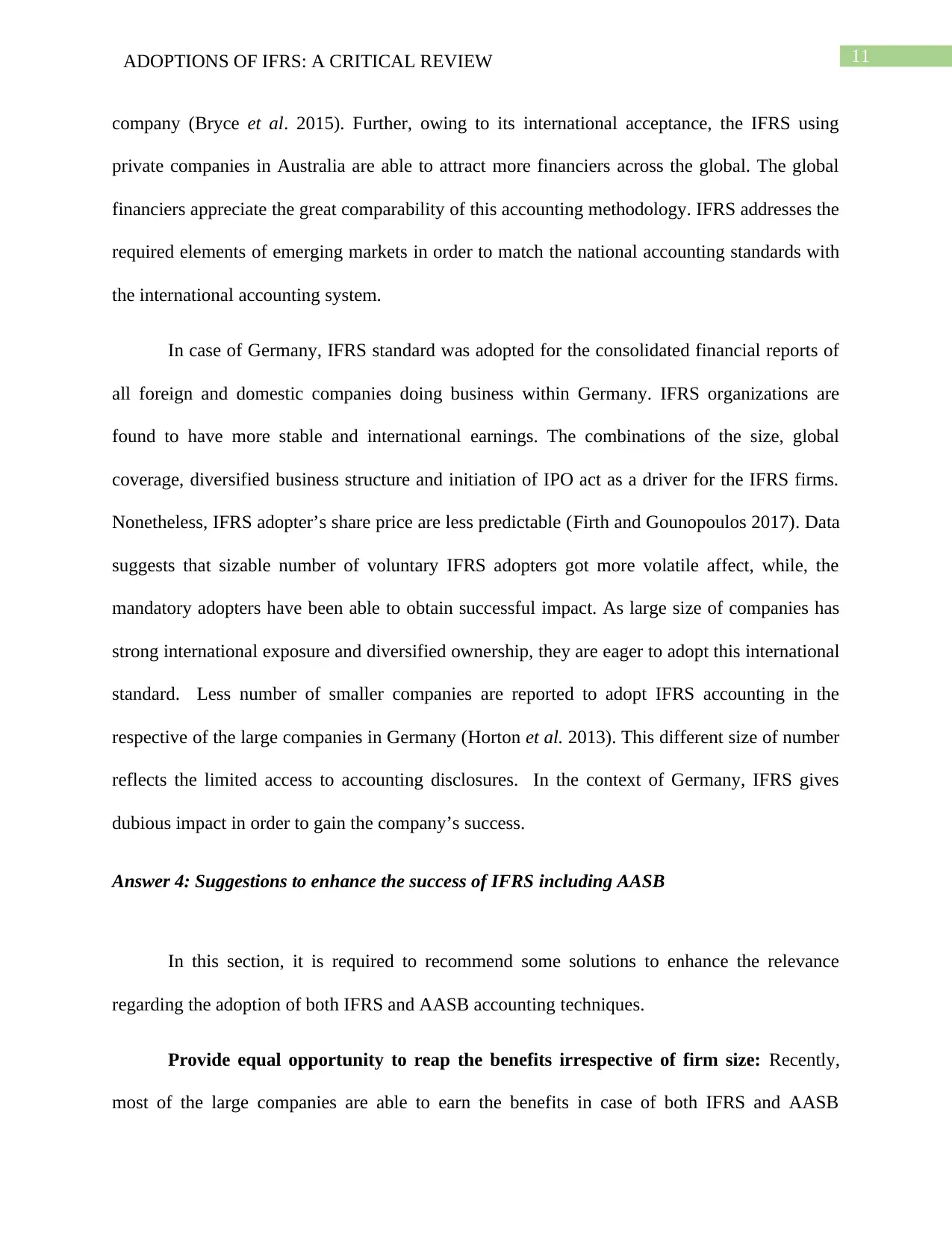
11ADOPTIONS OF IFRS: A CRITICAL REVIEW
company (Bryce et al. 2015). Further, owing to its international acceptance, the IFRS using
private companies in Australia are able to attract more financiers across the global. The global
financiers appreciate the great comparability of this accounting methodology. IFRS addresses the
required elements of emerging markets in order to match the national accounting standards with
the international accounting system.
In case of Germany, IFRS standard was adopted for the consolidated financial reports of
all foreign and domestic companies doing business within Germany. IFRS organizations are
found to have more stable and international earnings. The combinations of the size, global
coverage, diversified business structure and initiation of IPO act as a driver for the IFRS firms.
Nonetheless, IFRS adopter’s share price are less predictable (Firth and Gounopoulos 2017). Data
suggests that sizable number of voluntary IFRS adopters got more volatile affect, while, the
mandatory adopters have been able to obtain successful impact. As large size of companies has
strong international exposure and diversified ownership, they are eager to adopt this international
standard. Less number of smaller companies are reported to adopt IFRS accounting in the
respective of the large companies in Germany (Horton et al. 2013). This different size of number
reflects the limited access to accounting disclosures. In the context of Germany, IFRS gives
dubious impact in order to gain the company’s success.
Answer 4: Suggestions to enhance the success of IFRS including AASB
In this section, it is required to recommend some solutions to enhance the relevance
regarding the adoption of both IFRS and AASB accounting techniques.
Provide equal opportunity to reap the benefits irrespective of firm size: Recently,
most of the large companies are able to earn the benefits in case of both IFRS and AASB
company (Bryce et al. 2015). Further, owing to its international acceptance, the IFRS using
private companies in Australia are able to attract more financiers across the global. The global
financiers appreciate the great comparability of this accounting methodology. IFRS addresses the
required elements of emerging markets in order to match the national accounting standards with
the international accounting system.
In case of Germany, IFRS standard was adopted for the consolidated financial reports of
all foreign and domestic companies doing business within Germany. IFRS organizations are
found to have more stable and international earnings. The combinations of the size, global
coverage, diversified business structure and initiation of IPO act as a driver for the IFRS firms.
Nonetheless, IFRS adopter’s share price are less predictable (Firth and Gounopoulos 2017). Data
suggests that sizable number of voluntary IFRS adopters got more volatile affect, while, the
mandatory adopters have been able to obtain successful impact. As large size of companies has
strong international exposure and diversified ownership, they are eager to adopt this international
standard. Less number of smaller companies are reported to adopt IFRS accounting in the
respective of the large companies in Germany (Horton et al. 2013). This different size of number
reflects the limited access to accounting disclosures. In the context of Germany, IFRS gives
dubious impact in order to gain the company’s success.
Answer 4: Suggestions to enhance the success of IFRS including AASB
In this section, it is required to recommend some solutions to enhance the relevance
regarding the adoption of both IFRS and AASB accounting techniques.
Provide equal opportunity to reap the benefits irrespective of firm size: Recently,
most of the large companies are able to earn the benefits in case of both IFRS and AASB
⊘ This is a preview!⊘
Do you want full access?
Subscribe today to unlock all pages.

Trusted by 1+ million students worldwide
1 out of 18
Related Documents
Your All-in-One AI-Powered Toolkit for Academic Success.
+13062052269
info@desklib.com
Available 24*7 on WhatsApp / Email
![[object Object]](/_next/static/media/star-bottom.7253800d.svg)
Unlock your academic potential
Copyright © 2020–2026 A2Z Services. All Rights Reserved. Developed and managed by ZUCOL.





